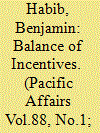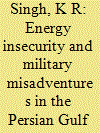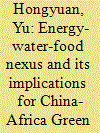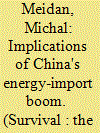| Srl | Item |
| 1 |
ID:
136711


|
|
|
|
|
| Summary/Abstract |
This study is concerned with motivations driving North Korea’s interaction with the United Nations Framework Convention on Climate Change, drawing on information from treaty reporting documents, along with project reports compiled by international agencies and official statements released by the North Korean government. The article draws on causal inference to explore the hypothesis that the leadership perpetuation and state survival imperatives of the North Korean government represent the most likely explanation for North Korea’s interaction with the international climate change regime. It finds a strong probability that North Korea is utilising the UNFCCC as a capacity-building vehicle across its agricultural and energy sectors, a weak issue_images_88_1_Hydroelectric dam at Sinpyong (July 2012)_Habibpossibility that North Korea’s climate change vulnerability is a compelling incentive for greenhouse gas mitigation, and the weak possibility that North Korea is using the Clean Development Mechanism under the UNFCCC as a means for generating foreign currency revenue. The paper argues that the balance of incentives underpinning these motivations can be linked to the leadership perpetuation and state survival imperatives of the North Korean government.
|
|
|
|
|
|
|
|
|
|
|
|
|
|
|
|
| 2 |
ID:
083378


|
|
|
| 3 |
ID:
117793


|
|
|
| 4 |
ID:
130867


|
|
|
|
|
| Publication |
2014.
|
| Summary/Abstract |
Ensuring access to foreign oil has lost its dominance in Beijing's energy-policy debates. Ensuring access to ever larger quantities of foreign oil has been a focus of debate in China since the late 1990s, when the country's growing oil-import dependence became an inescapable reality. Research institutes and advisers to the Chinese leadership had been preoccupied with identifying the risks associated with China's foreign-oil supplies and devising policies to mitigate them. Yet, as the debate unfolded, it became clear that securing oil supplies was only part of the problem. The overall balance of energy supply and demand, the impact of state-controlled pricing and administrative intervention on the domestic market, and the weakness of institutions governing the energy industry came to be seen as problems that were equally, if not more, pressing. Between 2000 and 2004, a series of events highlighted various aspects of China's energy insecurity and, combined with a change of leadership in Beijing, ultimately led to a shift in energy-policy choices.
|
|
|
|
|
|
|
|
|
|
|
|
|
|
|
|
| 5 |
ID:
106738


|
|
|
|
|
| Publication |
2011.
|
| Summary/Abstract |
Recent discussions on the development of European Union (EU) energy policy have become dominated by a discourse of insecurity relating to the questions of energy dependence and relations with energy suppliers, echoing the debate during the energy crises of the 1970s. This article compares the two periods, analysing the way in which the EU (and the European Community in the 1970s) reacted to disruptions to energy supply. The article critically applies the concept of securitization, arguing that while the salience of energy increased in both periods, the Europeans neither faced an "existential threat" nor adopted "extraordinary measures" in responding to the crises.
|
|
|
|
|
|
|
|
|
|
|
|
|
|
|
|
| 6 |
ID:
112447


|
|
|
|
|
| Publication |
2012.
|
| Summary/Abstract |
During the past decade, concerns about energy security have reached levels not witnessed in the developed democracies since the 1970s and early 1980s. In good part because of such concerns, each of the largest of these countries - Britain, France, Germany, Japan, and the United States - has conducted a major review of energy policy, initiated significant policy changes, or both. Also like the 1970s, recent years have seen a variety of proposals for international cooperation to promote energy security. This is where the similarities with the past largely end, however. In contrast to the earlier period, when the principal sources of concern in these countries were high oil prices and uncertain oil supplies, recent worries about energy security have been much more diverse. This paper describes these differences and explores their implications. It argues that the disparities in today's energy security concerns and policy preferences in the major developed democracies are due in part to the divergent policies pursued in response to the oil shocks of the 1970s. It also argues that the present differences will make meaningful cooperation by these countries to promote energy security, which was never easy in the past, yet more difficult.
|
|
|
|
|
|
|
|
|
|
|
|
|
|
|
|